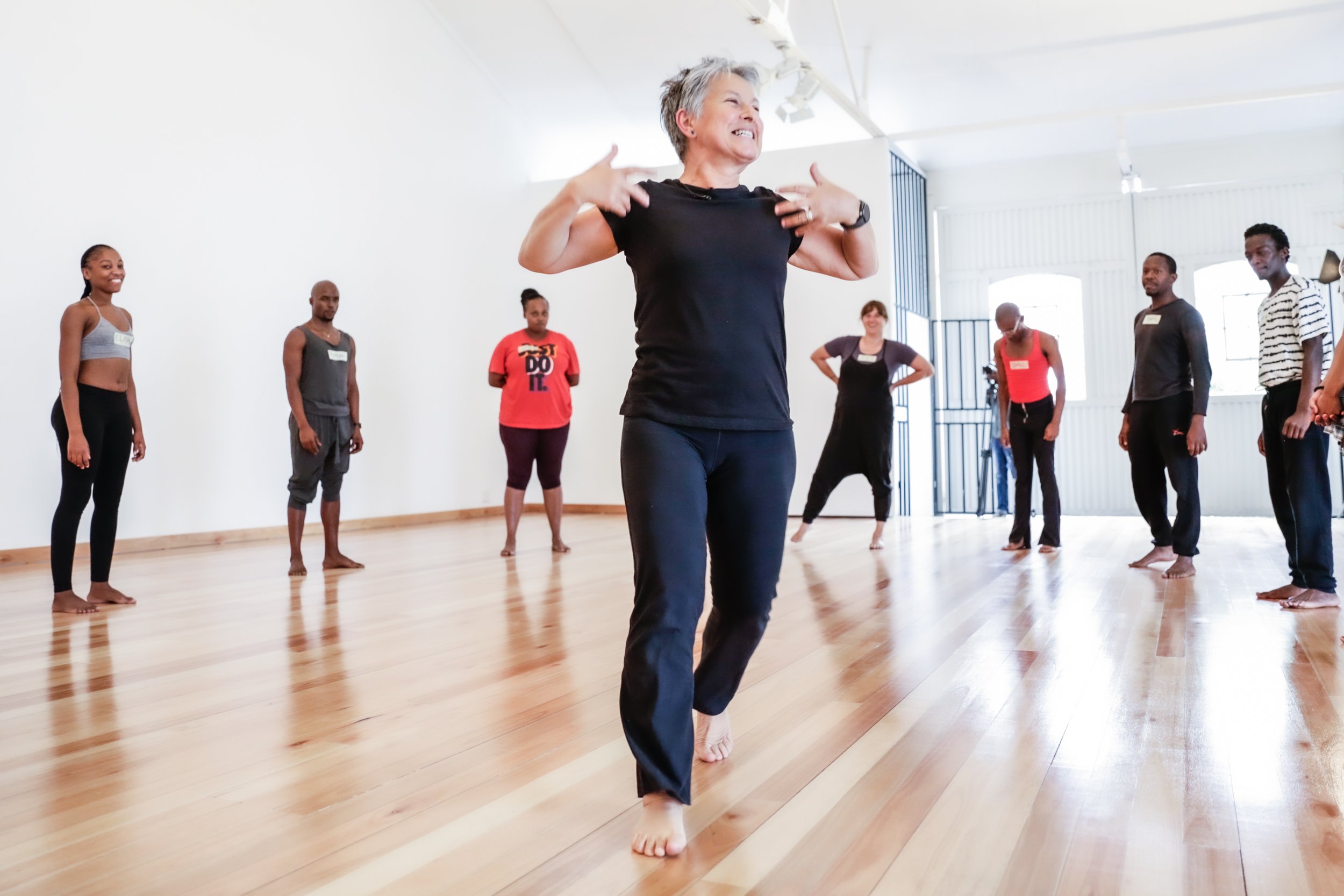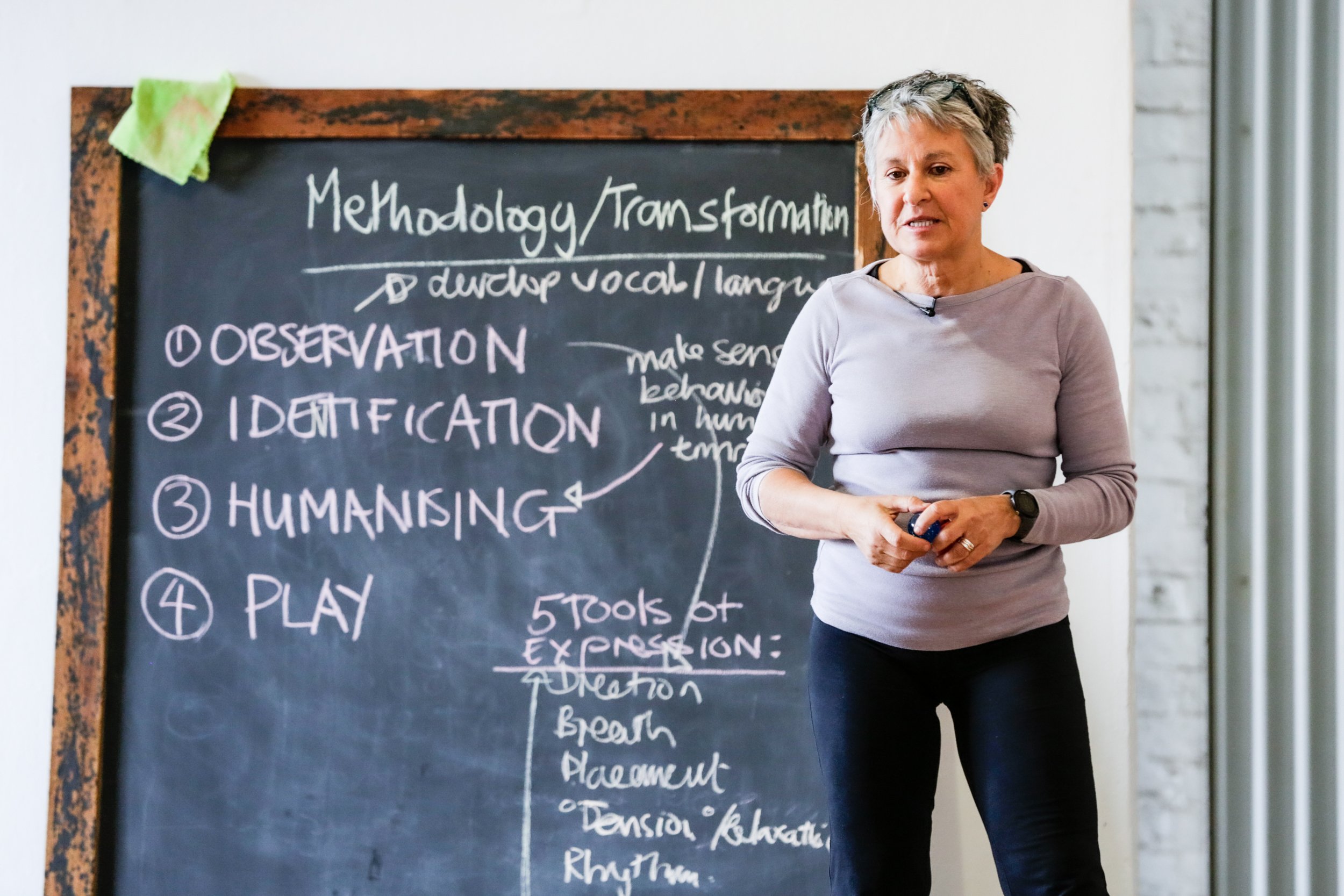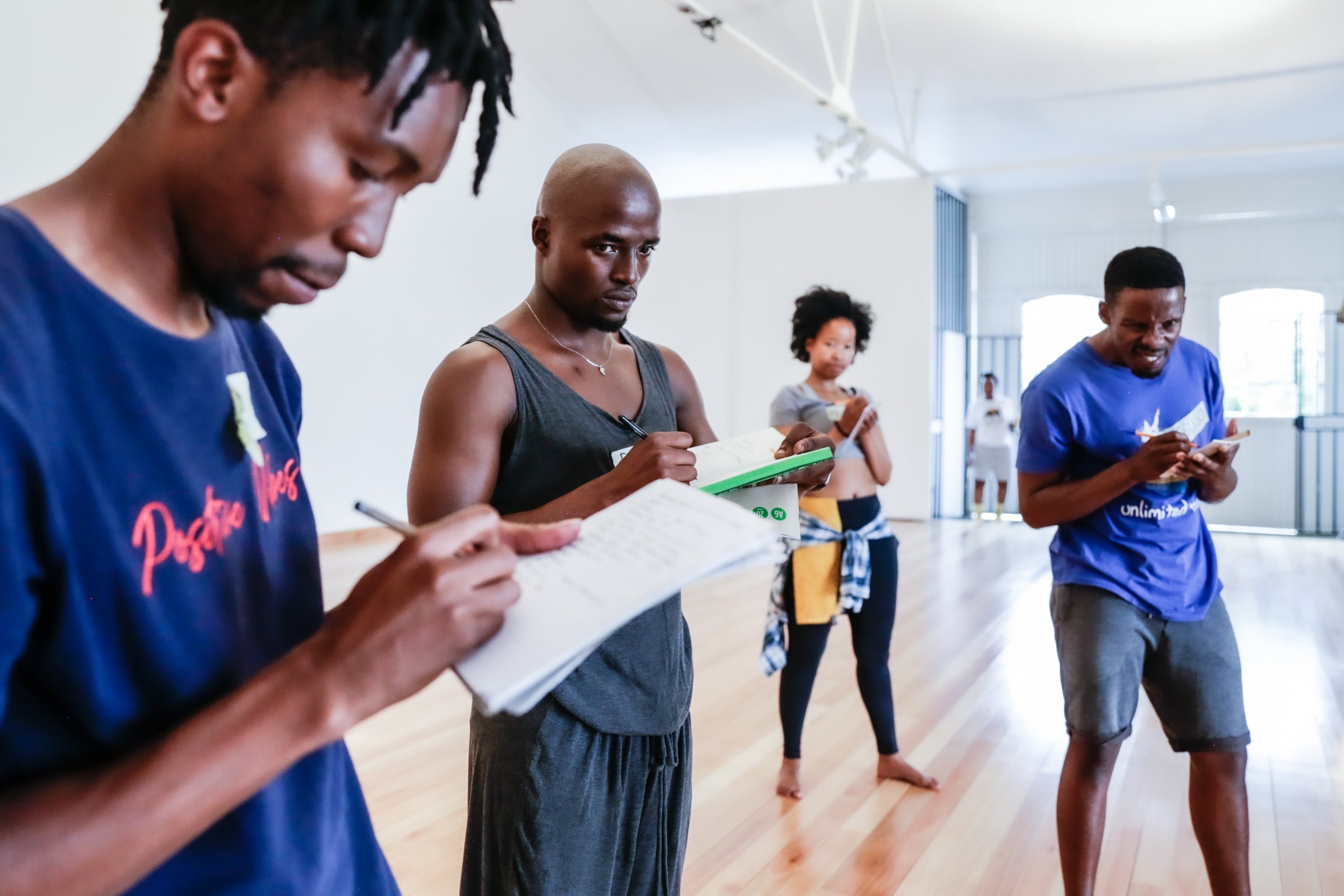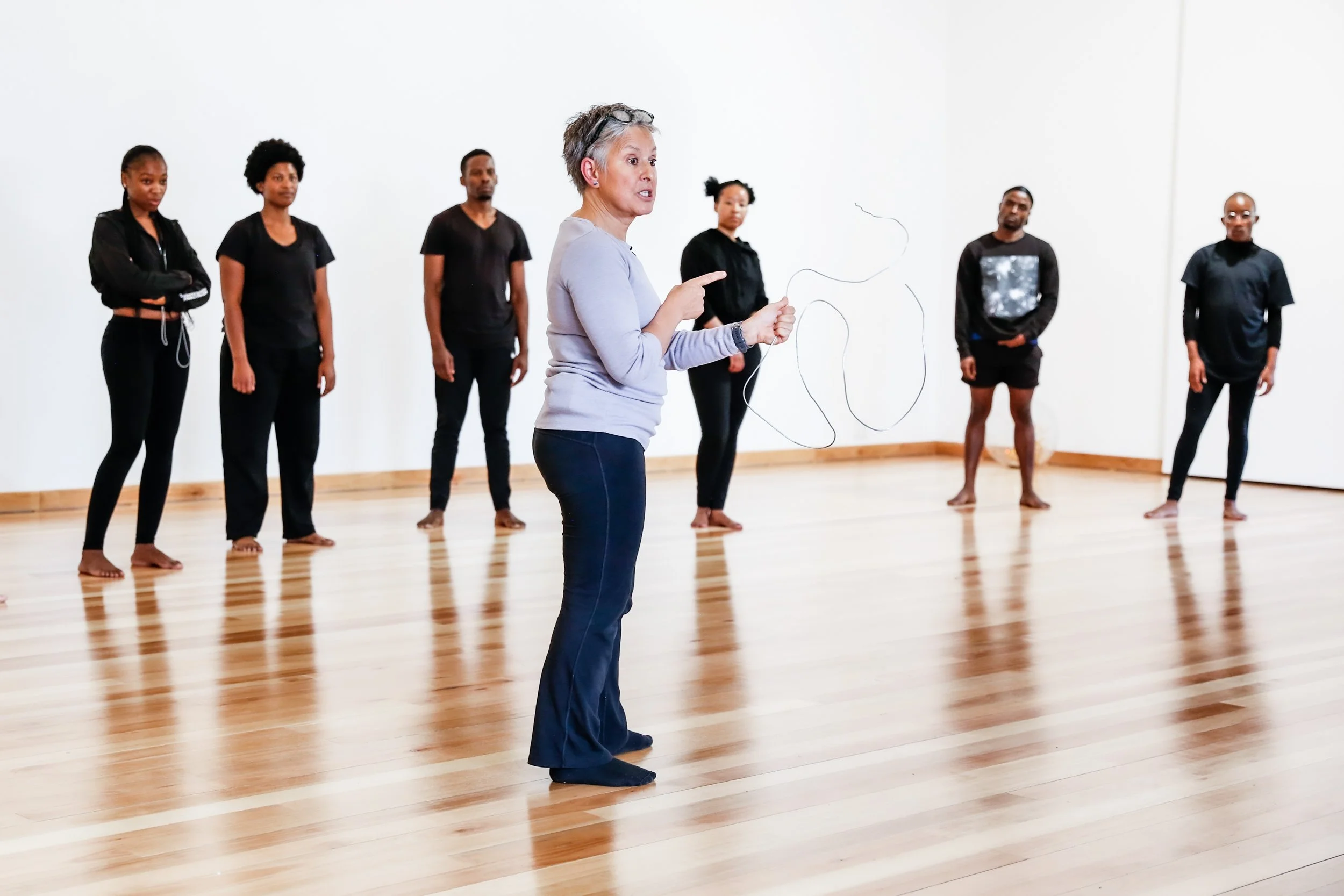JENNIE REZNEK | PHYSICAL TRANSFORMATION AND THE POETIC BODY
“The poetry is in the quality of the material. It’s about finding this quality in the body, too.” – Jennie Reznek
A cloth is thrown up into the air, unfurling and growing larger, lighter as it falls. A length of elasticated fabric snaps back on itself, sharply, silently. Plastic crinkles and sighs on the floor. A group of performers are on stage, working alongside these materials – observing them, mimicking them. Bodies rise, twist and turn, falling to the floor in a tangle of limbs, folding in on themselves. The activity, held in the bodies of these performers, begins to generate meaning and emotion. Soon enough, a story emerges.
From 10 to 12 November 2022, the renowned Cape Town-based performer, director, educator and Co-Artistic Director of Magnet Theatre, Jennie Reznek lead the workshop Physical Transformation and the Poetic Body at The Centre for the Less Good Idea. Hosted by SO | The Academy for the Less Good Idea, the workshop saw 12 Johannesburg-based participants being led through the workshop by Reznek.
Participants were introduced to various material impulses for physical transformation, framed as catalysts for creating character, choreography, relationships and shaping moments on stage. The three-day workshop also explored the dense relationship between word and the body and how the two are able to work together to create a third more complex and revealing thing.
The workshop culminated in The Open Moment, a public showing of the workshop’s process and progress, and a unique opportunity for audiences to witness Reznek’s approach and methodology.
Physical Transformation and the Poetic Body completes a cycle of three separate yet interconnected SO Academy workshops over the course of 2022 that focused on the body in motion and movement on stage. The cycle began in June with Luc De Wit’s exploration of presence and the significance of gesture through work with the Neutral Mask. It then moved onto an investigation of the performer within the Physical Ensemble, led by Andrew Buckland.
CREDITS:
Jennie Reznek is a graduate of UCT drama school (MA in Theatre and Performance) and studied with Jacques Lecoq in Paris from 1984 – 1986. Actress, director, artistic director and teacher, Jennie is a founder member and one of three Artistic Directors of Magnet Theatre in Cape Town. She runs the bulk of the youth development and performance programmes of the company along with Co-Artistic Directors Mark Fleishman and Mandla Mbothwe. She is a multi-award-winning actress and has created over 30 new pieces of physical theatre under the banner of Magnet Theatre that foreground the language of the body and which respond to the South African archive and context.
The twelve participants selected for the Physical Transformation and the Poetic Body workshop were: Campbell Meas, Elma Motloenya, Gcebile Dlamini, Kaldi Makutike, Kyla Davis, Mlindeli Zondi, Phumlani Mndebele, Phuti Chokwe, Rethabile Headbush, Sboniso Thombeni, Soyiso Ndaba and Thamsanqa Majela.
Athena Mazarakis is the Momenteur for the SO Academy
PHOTOGRAPHER | Zivanai Matangi
WAYS OF THINKING
“It’s all already in you – everything you’re doing – you just have to take it away from the material and bring it closer to the body.” – Jennie Reznek
What does the act of observation do for the performer? How can the qualities of a particular object or material help us generate feeling and meaning?
For Reznek, performance is about a series of fundamental realisations about how one moves through the world, channeled through the vital act of looking more deeply at the world around us, and reflecting this through the transformation of the body.
A methodology of observation and transformation
“We’ll be reading a lot, looking at images and how bodies work, how images are made with the body.”
Observation is an essential part of how we make sense of our bodies. Reznek is a keen and considered observer. For her, the act of observation is a vital, deliberate and embodied act. It is a means of breaking down and identifying the minutiae of movement.
On day one of the workshop, Reznek began by opening up the space to the participants, and finding out what it was that they wanted to achieve over the next few days. A return to, or a rediscovering of one’s body was the resounding response.
Following a few basic warm-up exercises designed to familiarise the participants with the space and with each other, Reznek proceeded to outline Five Tools of Expression, namely: Placement. Breath. Rhythm. Tension/Relaxation. Direction.
How is a person walking? How does breath influence movement and emotion? What is the cadence of a particular gesture? Through a series of short, sharp exercises, Reznek located and unpacked each of these “tools” and their impact on the body, the way they influence how we move through spaces, and why. All of them form part of a practice of observation – our ways of seeing and reflecting what we see around us. Exercises involving frozen choreographic moments allowed participants to better note the direction of the head, the tension of the limbs, and what sort of story this comes to tell.
Day two, then, saw Reznek placing these tools and ways of seeing in the context of a broader methodology that includes observation as well as identification, humanising, and play. The primary source of these exercises and impulses for transformation, she explains, comes from French actor, educator and mime Jacques Lecoq.
“The condensation of the methodology is something that I have developed over the years – to try and make it packageable for young people to work with so they know what they are looking at. Lecoq was a bit more mysterious in the way that he worked, but those exercises are definitely distilled from him,” she explains.
She also cites the work of South African dancer, choreographer and teacher Alfred Hinkel as an influence on her own work, specifically Hinkel’s manner of understanding the body through dance and how space is articulated around the body itself.
Material impulses
“Once you step into a moment in the body, it never leaves you.”
A collection of seemingly random objects supplement the workshops. Balls – some with a solid bounce, others filled with glitter and air – fabrics, plastic bags and bicycle chains are some of the objects Reznek has introduced to the workshop.
The balls, scattered throughout the space, become objects of instruction. Participants are made to mirror the movement, direction and particular quality of the ball. Some bounce around furiously, others roll, slowly, and rock themselves into stillness.
“The language of the object reveals what it is to be a human being,” explains Reznek. “In working with materials or matter, you need to shift your relationship to the matter.” A responsiveness to the environment becomes essential. The body, like the matter it observes, is never still, always reacting.
The use of steel wire, with its rigid bounce and receding rhythms, gave way to an exercise in narrative and emotion. Tasked with delivering a political speech while embodying the quality of the wire, participants tested the language of power and instruction through the spring-loaded movement of the steel-wire.
Fabric, plastic bags and bicycle chains were employed to similar ends, although with the added provocation of humanising and playing with the material through the narrative of a family holiday.
Here, each material lent its own emotional quality to the performances. The bicycle chain became a trio of sisters on their way to the beach, talking about boyfriends and dream trips to the Bahamas. The elastic was a bickering trio, shrill and sharp, constantly fighting amongst themselves. The fabric surfaced a certain softness and sweetness, while the crinkling plastic becomes a reaction to the cold – they are tired and worn, too exposed to the elements.
The idea that all of this – the gesture, emotion and physicality – is already in the body became something of a refrain in the workshops, both an encouraging reminder to participants, but also a reflection on what one’s body is able to hold.
“It’s a kind of philosophical understanding of being everything all at once,” explains Reznek. “I work a lot with objects for this reason – colour, too. It’s about observing a quality and locating it in the body. To look at a ball and say ‘yes, I do have bounce and lightness and air’. And it’s a deliberate thing to try and see that. You’ll recognise the things that you want to see.”
A haiku for the stage
On the final day of the workshops, Reznek led participants through an exercise in poetry, utilising the economy and impact of the haiku.
Participants were tasked with creating a poem using three lines (although not necessarily adhering to the strict format of 17 syllables arranged in a 5–7–5 pattern). Reznek led the exercise with a few prompts centred around one’s concept of home as well as an evocation of a sense – smell, taste, sound or otherwise.
Poems were then run through a process of embodiment and performance where the body came to stand in for lines of poetry, and a single word was employed to communicate a vital moment in the poem. Ultimately, each participant’s embodied haiku exists as a literary and performative vignette, culminating in a series of short, sharp and evocative moments.
As Reznek puts it, the result is an exercise designed to explore “the dense relationship between word and the body and how the two are able to work together to create a third more complex and revealing thing.”
Empathy as a tool for teaching
Above all else, it was Reznek’s ability of harnessing empathy as a tool for learning that allowed the workshops to be as generative and engaging as they were.
Each day began with a moment for feedback and reflection, a way of “bringing the brain to the body to listen.” Participants were encouraged to reflect openly on the process, their expectations of the workshops, and their own physical and emotional states. As Reznek puts it, generating empathy is essential to the process of creating and engaging with performance.
“People talk about theatre as being this empathy gym, because it’s a place where you are watching and deliberately being asked to feel something for someone on stage and that’s part of the journey of identification,” says Reznek.
By fostering and maintaining empathy through these constant conversations with the participants, as well as in the exercises of the workshop, Reznek also instils a great level of trust amongst the performers, encouraging a greater sense of play and creative exploration.
— David Mann
PHOTOGRAPHER | Zivanai Matangi
THE OPEN MOMENT | PHYSICAL TRANSFORMATION AND THE POETIC BODY
The Open Moment is a public showing of the exercises, methodologies and improvisations employed over the course of the three-day workshop Physical Transformation and the Poetic Body, led by the renowned Cape Town-based performer, director, educator and Co-Artistic Director of Magnet Theatre, Jennie Reznek. The Open Moment was held at The Centre for the Less Good Idea on 12 November in The Other Space.
The third and final part in a thread of modular unfoldings all centred around the body in motion and movement on stage, Reznek’s workshop explored various material impulses for physical transformation, framed as catalysts for creating character, choreography, relationships and shaping moments on stage.
For The Open Moment, Reznek leads the 12 participants through the exercises of the workshop – some of them inspired by Jaqcues Lecoq, others drawn from her own practice. An exercise in greeting demonstrates how breath changes the body and how this influences the emotional quality of the performance. Similarly, in a series of frozen choreographic moments, we come to learn how the simple tilt of the head and the tension held in the limbs can convey a certain narrative.
Observation, explains Reznek, is integral to our daily lives. As the participants engage in the exercises, she guides the audience through her ways of seeing.
Reznek then talks participants and audience members through the use of objects as a “pedagogical trick” and how objects can function as impulses for change. Here, participants mirror the movement, materiality and unique qualities of a variety of objects, embodying the weightlessness of fabric, the metallic tangle of a bicycle chain, the raspy crinkle of a plastic bag, and the stretch and snap of an elasticated band. A series of semi-improvisational showings reveals how a unique narrative can emerge when the body engages with material impulses in this way. “The poetry is in the quality of the material,” explains Reznek. “It’s about finding this quality in the body, too.”
Concluding The Open Moment is a series of short-form showings that emerged from an exercise Reznek conducted with the participants involving the structure of a haiku. Here, participants channel memory, emotion, storytelling and experimental physicality through a unique combination of body and text. The result is both compelling and instructional.
— David Mann
CREDITS:
FACILITATOR | Jennie Reznek
PARTICIPANTS | Campbell Meas, Elma Motloenya, Gcebile Dlamini, Kaldi Makutike, Kyla Davis, Mlindeli Zondi, Phumlani Mndebele, Phuti Chokwe, Rethabile Headbush, Sboniso Thombeni, Soyiso Ndaba & Thamsanqa Majela








